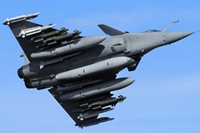Rafale fighter deal put off as India’s defence budget exhausted
07 Feb 2014
India has postponed finalising the deal to buy 126 Rafale fighter planes from France's Dassault Aviation until the next financial year, as the government has almost exhausted its budget for defence procurement for the current year, defence minister A K Antony said on Thursday.
 New Delhi had picked the Rafale fighters for exclusive negotiations in January 2012 and had been expected to finalise the deal, estimated at $15 billion (Rs94,000 crore), by the end of March. But the negotiations to buy 18 planes off-the-shelf and build the rest in India have slowed and will stretch into the next financial year Antony told a news conference at a defence sector trade fair.
New Delhi had picked the Rafale fighters for exclusive negotiations in January 2012 and had been expected to finalise the deal, estimated at $15 billion (Rs94,000 crore), by the end of March. But the negotiations to buy 18 planes off-the-shelf and build the rest in India have slowed and will stretch into the next financial year Antony told a news conference at a defence sector trade fair.
The Indian military, the world's biggest arms importer for three years running, has already spent 92 per cent of its defence capital budget for this year, he said. "Major procurement can only be possible in the next financial year. There is no money left.''
The ministry will seek to boost next year's budget as lack of funds also hurt India's plan to take delivery of some Lockheed Martin Corp C-130J planes, Antony said. However, this can hardly be his call as a new government will be in place long before then.
Asia's third-largest economy has tripled defence spending over the past decade as it increasingly looks beyond Russia to modernize the military and orders arms from countries including the US. This is largely because unlike other countries including China, its system for indigenous manufacture of armaments, riddled with bureaucracy, has never really taken off.
For instance, a programme to manufacture home-grown combat planes to replace ageing Russian MiG-21 fighters is running 15 years behind schedule.
India is in the midst of a $100 billion defence modernisation programme to replace Soviet-era planes and tanks, and narrow the gap with China, with which it fought a war in 1962. A border dispute lingers.
Antony said there could be delays in arms procurement decisions as he tried to clean up the process, but it was important to send a message that India would tolerate no wrong-doing in these deals.
"Everybody will get opportunities, if products are good and prices are low. There is no need to do lobbying," he said.
India chose the Rafale after a bidding contest against the Eurofighter Typhoon aircraft, made by a consortium involving Airbus Group, Finmeccanica and BAE Systems.
Dassault Aviation's chief executive Eric Trappier said in December that he was optimistic about finalising the fighter jet deal within a few months, though he was unsure whether it would be sealed before or after the national election.
Antony said the two sides were also trying to tackle the issue of life cycle costs relating to the Rafale.



















